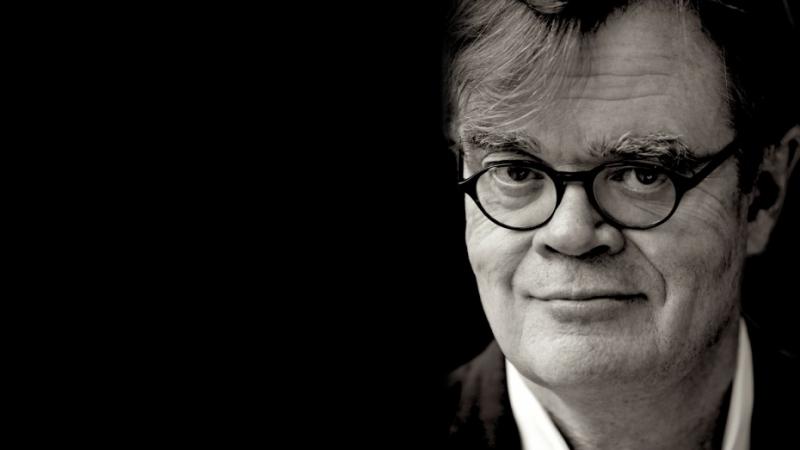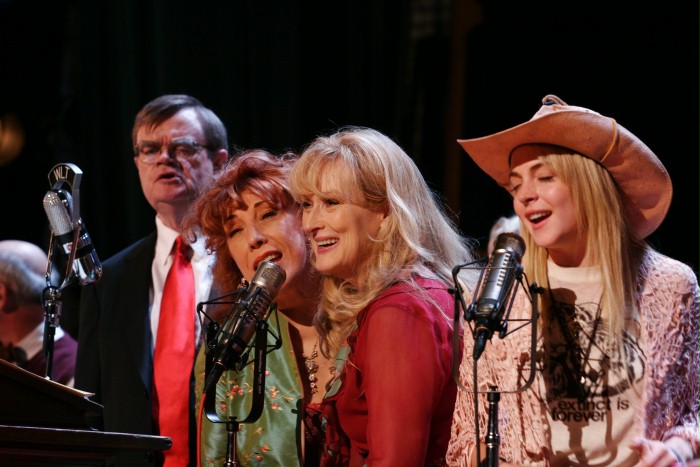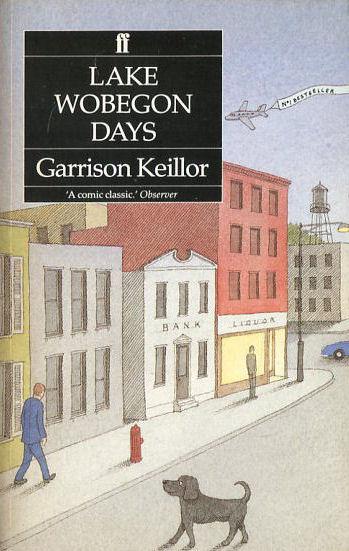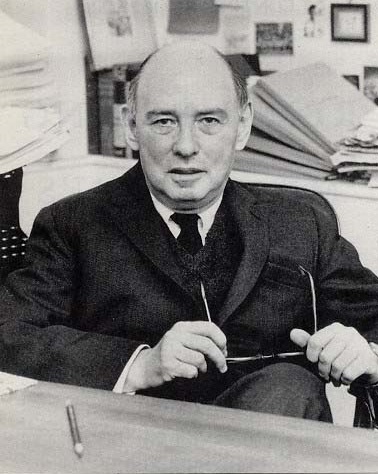theartsdesk Q&A: Garrison Keillor | reviews, news & interviews
theartsdesk Q&A: Garrison Keillor
theartsdesk Q&A: Garrison Keillor
As he hosts 'A Prairie Home Companion' for the last time, its creator looks back

It's been a quiet week in Lake Wobegon, and has been for the past 42 years, ever since Garrison Keillor first reported on the town's goings-on in his weekly radio show A Prairie Home Companion. Keillor's purring baritone is the gentle voice of non-coastal America, and it is picked up by 700 local public radio stations by four million listeners. But at 72, and after a health scare, Keillor is stepping down.
Keillor's first fame as a writer was as a regular contributor to William Shawn's The New Yorker. That arrangement came to an end when Tina Brown became editor. Keillor was distraught at the changes, but by then he had become an international success as the author of Lake Wobegon Days. His first novel - the term applies only very loosely - was published in 1985, and continued his work on A Prairie Home Companion. Wobegon, based on Anoka in Minnesota where Keillor grew up, was a sleepy lakeside community where unfussy Midwesterners dealt life's indignities - senility, marital failure, bodily malfunctions - whatever their ethnicity or denomination: German, Norwegians, Lutherans, Presbyterians, Plymouth Brethren (of which strict sect Keillor was himself a member until the age of 20).
More books followed: Leaving Home, We Are Still Married, Wobegon Boy, Lake Wobegon Summer 1956, Pontoon, Liberty and other titles not involving Lake Wobegon. Keillor entered popular culture, getting lampooned on The Simpsons and Family Guy. A movie of A Prairie Home Companion, fictionalised a day the show is recorded, starred Keillor alongside Meryl Streep and Woody Harrelson, further cementing Keillor's status as a national institution. (Pictured below: Keillor with Lily Tomlin, Meryl Streep and Lindsay Lohan)
As of 1 July, when his last show is broadcast from the Hollywood Bowl, it's going to be a very quiet week indeed in Lake Wobegon. To mark the end of an era, theartsdesk publishes this interview in which Keillor talks about himself, his writing career, Lutherans and various Scandinavians, about New York and The New Yorker, and his native Minnesota.

JASPER REES: One of your novels begins with the line, "I'm a cheerful man, even in the dark." Is that you too?
GARRISON KEILLOR: I think so, yes. But I think that cheerful people often have a dour exterior. This is a good defence for a cheerful person, to take an easy sceptical view of what's around, and to refuse to trade in cheerfulness - that is not to bestow smiles on strangers as a prelude to doing business, to grease the skids.
Is that form of cheerfulness a Minnesota thing?
I think so but I don't know. Minnesota is more easily defined if you're writing about a fictitious small town than if you're writing about the state of Minnesota which includes Minneapolis, a city that does not want to believe that it's in Minnesota. But people from the Midwest do take an ironic view of the dominant culture, which is coastal.
It seems as if the novels have to stop so you can tell stories, and it seems to happen more and more. Your novels are often more like an anthology of short stories. It's a mid-Western trait?
It's a rural trait. City people would be more comfortable showing what they know, what they're read, formulating and arguing and going back and forth with it and having a battle of wits. And I think rural people would be less comfortable with that. They would avoid that. You're less likely to throw out dogmatic opinions, extravagant opinions, for fear of alienating these people that you'll be living with for the rest of your life. So you try to bury these differences and instead you converse by telling stories from your own treasury of what's happened to you. And this is how rural people exchange bona fides, so that you know that the person you're talking to is a decent and good and respectful and admirable person. There's nothing that rural people would admire more than the ability to tell a good story and tell it well, a story about yourself, your own experience.
 Lake Wobegon Days is in microcosm the story of the colonisation of America. It's the immigrant's story.
Lake Wobegon Days is in microcosm the story of the colonisation of America. It's the immigrant's story.
There are immigrants in it.
Do you have any Norwegian blood?
No none whatsoever that I'm aware of. My maternal grandparents came from Glasgow. They came over in 1911. And my father's parents - one of them came from Yorkshire, the family is traced back to Yorkshire by way of Nova Scotia, and my paternal grandmother is a combination of Welsh. Powell is her maiden name.
Where does the surname come from? It doesn't sound very Yorkshire.
It is. My ancestor Thomas Keillor emigrated from Yorkshire to Nova Scotia in 1770.
Did he spell it the same way?
Yes he did. We've traced it back to where the spelling was a little uneven, back in the 16th century. So there are varying spellings of it. The marmalade manufacturer up in Dundee spells it with an -er.
Why did you choose to write about Norwegians and Lutherans. It's not your ancestry.
But it suits my ancestry. I think that between the Scots and the Scandinavians there are very close ties so I think it's very useful to me to change the details that don't matter.
Nationality.
Yeah. I don't want to have my family uneasy. Scandinavians are one of the last, aside from us Anglos, are the only ethnic group you can make fun of.
Why's that? All the others have organised their own defences?
They're very defensive about it.
The Norwegians don't mind.
No because Norwegians have always made fun of Swedes, Swedes of Norwegians. Even as they were intermarrying they told the same jokes about the other as say people used to tell about the Polish. But you would never tell those jokes. You'd have to be very careful telling those jokes, and you could never tell them in a mass medium in America. You can never tell jokes about Polish people. These people have a tradition of telling jokes on themselves.
How have the Lutherans taken to your portrait?
They enjoy it. I don't think that I have been any crueller to them than they are to themselves. That is, I like Lutherans. I always enjoy living in the midst of Lutherans. And my plan is when I die that I would like to die in the company of Lutherans. I would like to have middle-aged Lutheran women tending me, because of their kindness, and because of the way they talk. They talk in the way that to me means home. It's the small talk.
When did you secede from the Plymouth Brethren?
I left when I was 20.
With much dismay among those you left behind?
Yes, but I don't know. I simply walked away. I was a fervent believer and I walked away on a point of principle but I left really because it's such a terrible legalistic sect.
 You deal with that in Lake Wobegon.
You deal with that in Lake Wobegon.
A little bit. But they're not such a funny group or so much fun to talk about. The Sanctified Brethren, I call them.
Are your parents still sanctified?
Oh absolutely.
Could you describe your father to me?
My father is a carpenter, he grew up on the farm, and he's always worked with his hands. He was very merry, he likes jokes and he loved to kid around with children, but more with other people's children than his own. With his own children he was more stern.
Is the distant father another Lutheran characteristic?
I think it's a characteristic of the human race.
Wobegon Boy ends with the hint that there may be such a thing as a perfect marriage: it's a wonderful romantic ending. Is there an element of wish fulfilment. There was a quotation in one of the radio shows: "Marriage is a form of being snowbound." You've been snowbound three times now.
I love being snowbound. Have you been snowbound? No of course you haven't.
Oh you mean literally.
It's delicious, and it is a great pleasure, and it's become unfortunately rare. Road-clearing equipment has become too good and we've invested so much in making roads passable year-round.
We've strayed from the metaphor.
Yes but we have to know that what I mean by snowbound, I'm not meaning what other people may mean, who think of it as an annoyance, a disruption of their lives. I think of it as a restoration of their lives, to have the roads closed and be unable to go anywhere and if the telephone should go out, all the better.
Why is marriage like being snowbound?
Because it eliminates all of the false choices and all of the illusions of alternatives and it brings you down to what you really have and who you really are. You and this other person have made a compact to be important to each other in the most crucial ways. That's a magnificent thing for anybody to have done.
Is the novel a natural form for you, because you are instinctively digressive?
No, but it's a challenging form and for some reason I seem to have lost my interest in the short comic essay that I used to do and that more than the novel has been the real heart of American humour - is the story, is what at The New Yorker they used to call the casual. Something that might drift into fiction but in which there is always a strong narrative voice, usually first person, and others, and it's what Thurber wrote, Perelman, and Benchley.
Why have you lost interest in that form?
I don't know.
When did it happen?
When I left The New Yorker. I guess that I associated that form so much with that magazine that even though there are other magazines that would print it it's not the stimulus to me that it would be. I grew up reading The New Yorker so it was a very very important magazine to me and when I wrote for The New Yorker it completed a circle for me that went back to when I was 13 years old and read Benchley and Thurber. I'm not bitter about all that. It's a fact of life. I loved writing for the Talk of the Town, which before Tina Brown came in was an unsigned piece and that to me was so lovely.
 What was it like to write for William Shawn (pictured right)?
What was it like to write for William Shawn (pictured right)?
William Shawn was an editor who lived an isolated life, he's famous for the fact that he didn't drive, he hardly ever left New York, his life was the magazine. So William Shawn is interested in you as a writer because you can tell him something about the world out there that he's never going to find out on his own. He's a monkish man and he has a powerful sense of curiosity. The last thing William Shawn would ever have done was to tell you what you should tell him. To him that would have been absurd. He wanted to know what you were on fire to write about.
Where were you living at the time of your first publication in The New Yorker?
Minnesota - I was working for a radio station. I had a morning show. I got up at four in the morning. It was a tiny piece called “Local Family Makes Someone Happy”. It's about a family that hires a prostitute for their teenage son because they're worried about him getting into trouble. Not what most Plymouth Brethren would have written for their first piece in The New Yorker. I don't think they noticed, but if they did they were too polite to say.
There’s a scene in one of your novels where a writer switches the books at Barnes & Noble to have his own work seen to better advantage. Have you ever done that to your own books?
Yes of course.
But surely there was no need to. Lake Wobegon Days raced out of the shops.
I've been doing it ever since. Always allow extra time on book promotion tours to go round and improve the show position. You don't think other writers do that?
I'm not suggesting they don't. I'm suggesting you don't need to.
Easy for you to say.
Was there a distrust of New York in Minnesota?
Oh yes, complete and absolute. That New Yorkers are rude, they are pushy, they are ill-mannered, they are a brutal people, and they are materialistic beyond the bounds of decency, they will do anything, say anything, believe in anything, in order to grasp the immediate advantage.
I was married to a Danish woman who found it very painful to live in Minnesota
Is this why it took you 45 years to get here?
I came here looking for a job when I was young and I didn't have the courage to be poor in this city. I decided, first of all if you're a writer you're going to go through a period where you don't have beans, and it's a lot easier to be poor in Minnesota. there's always relatives or friends to fall back on. When I was first writing for The New Yorker and living off what I earned from them, I lived in a farmhouse with my first wife and son and the rent was $80 a month, around 1970 and it was low then, it was I would say half of what you'd pay for any apartment in Minneapolis and a third of what you'd pay for any apartment in New York, no matter how tiny. And you had a garden, we raised vegetables, we lived well. It was a farming area with a lot of beef and pork producers around, and you could from the local locker plant get real cheap and very good beef. So here I was. I had a monthly amount that I had to make of maybe $200, and The New Yorker was paying at a minimum of $750 and my stuff was getting up to $1000, $1200, and they had this very baroque bonus system back then. You could, living in that house in Minnesota, you could write three stories a year for The New Yorker and get by. I wrote more than that, six, seven, and that was a princely life. That was not a hard choice to make. What's the grandeur of living in a dive in the Village in a crowded neighbourhood, you don't know anybody?
What about the choice to come here?
In writing, really proximity means nothing. At the old New Yorker it didn't matter that they never saw me. It was always on the page. That was the whole thing.
Why did you come?
I came because I was married to a Danish woman who found it very painful to live in Minnesota and found it very painful being married to me in Minnesota. This was at a time when Prairie Home Companion was at a peak of public interest, and so every time we walked down a street people would whisper, and this caused her great distress, and so I ended the show and moved to New York to accommodate my wife. It was one of those disastrous steps you take in life.
But you've been here ever since?
Oh New York isn't a disaster. But I have no reason to be here other than the fact that I get pleasure out of it.
When did you go to Denmark?
That was sort of before and then during.
 Ironic that having written about Norwegians you should end up living next door in this country where ...
Ironic that having written about Norwegians you should end up living next door in this country where ...
People are despised by Norwegians.
And vice versa.
Danes just look down on Norwegians as simple rural people, skiers.
Did they look down their nose at you as an ersatz Norwegian?
No, I was in an odd position of somebody who's trying very hard, harder than I should have tried, to speak Danish.
Why harder?
Because there's no point. I enjoyed trying to learn it. I had a good ear for it, I had a good accent, but I never was there for long enough and I never really committed to it, and I was never comfortable with it. So these lovely people, whose English was of course exquisite, sat and indulged me. They found it very hard to talk to me, because my Danish was the Danish of a 12-year-old who's had a few interesting experiences, a 12-year-old who has been married twice.
Did you continue to write?
I did but I didn't find it easy to write over there. I thought that I would. But I really felt this language deprivation over there. It's such a strange experience. I'm not proud of my response to it. I did not respond well to it, and all I can say is that I tried really hard over a period of many years.
So you came back and began the radio show?
Yes, right.
Were you funny as a kid?
No, but I liked to tell jokes. Somebody told me a joke the other day that I remember telling as a kid. I think I got it from a friend because it wasn't the sort of thing you'd read in a magazine. A man goes to the doctor and he's waiting in the waiting room and a nun comes out of the doctor's office and she looks drawn and haggard and terrible and the man walks in and says to the doctor, "Boy, that nun - it really looks like something's wrong." And the doctor said, "Yeah, I told her she's pregnant." And the man said, "Really, is she?" And the doctor said, "No, but it sure cured her hiccups." A joke that just skirted on the edge of being a dirty joke, but it wasn't a dirty joke, it was a joke that sounded like it might be dirty, but you could tell it to your aunt.
An immaculate conception of dirty jokes.
Right, an apotheosis of a dirty joke.
What music did you grow up listening to?
Hymns sung a cappella by my family and fellow brethren, people singing in four-part harmony a cappella without of a pitch pipe. Everybody did. I learned when I was quite young how to hear the interval of a third, to be able to sing an alto and then to pick up the bass note when I got old enough.
When did you first hear pop music?
I started listening to it when I was a teenager. The first rock'n'roll station in the Twin Cities I think was 1955. But I remember hearing soul music, though I didn't know what it was exactly, before then, and it came from a station in Little Rock that came in at night. Before the dial in America got all cluttered up you used to be able to pick up radio stations, especially in winter, especially at night, the AM single would jump and skip in odd ways, bounce off clouds and so forth, and that was part of the romance of radio to me, to be able to pick up Salt Lake City. Pittsburgh, we could get. WSM in Nashville, and WLS in Chicago, these were all powerful stations. You heard things that you didn't heard in the Midwest. Now commercial radio is completely homogeneous, almost absolutely.
Did that music mean that much to you?
Yes I liked it. It was mysterious. I didn't know much about it. It was far away. The Grand Old Opry was interesting to me as a kid. People on stage in Nashville Tennessee and a lot of steel guitars and comedy that I didn't find that funny.
I read that part of the reason Prairie Home Companion happened was because you felt you could do better than the Grand Old Opry.
I went down there to write an article about the Opry for The New Yorker in '74. And it wasn't that I thought I could do better, it was that I watched these people on stage and it just seemed like they were having such a good time it would be possible to go back and start one like that. Which I did.
Explore topics
Share this article
The future of Arts Journalism
You can stop theartsdesk.com closing!
We urgently need financing to survive. Our fundraising drive has thus far raised £49,000 but we need to reach £100,000 or we will be forced to close. Please contribute here: https://gofund.me/c3f6033d
And if you can forward this information to anyone who might assist, we’d be grateful.

Subscribe to theartsdesk.com
Thank you for continuing to read our work on theartsdesk.com. For unlimited access to every article in its entirety, including our archive of more than 15,000 pieces, we're asking for £5 per month or £40 per year. We feel it's a very good deal, and hope you do too.
To take a subscription now simply click here.
And if you're looking for that extra gift for a friend or family member, why not treat them to a theartsdesk.com gift subscription?

Add comment